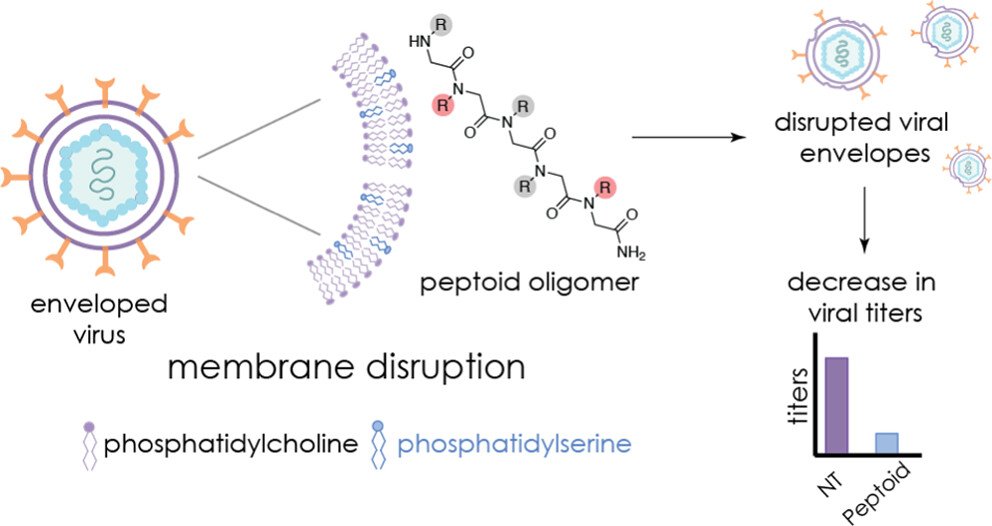Maxwell Biosciences Announces Publication of Mechanism of Action Study: Claromer Compounds Target Pathogens by Disrupting Their Membranes
Austin, Texas--(Newsfile Corp. - August 2, 2023) - Maxwell Biosciences, a pioneering preclinical drug platform company, today announced publication of a revolutionary mechanism of action study for their Claromer® compounds in the journal ACS Infectious Diseases.
In this study, the researchers showed how a group of novel molecules - inspired by the human immune system - inactivates several viruses, including all tested Influenza, Coronavirus, Hepatitis, Herpes, Zika and Chikungunya strains. Their approach may lead to drugs that can be used against many viruses, and help overcome wide-ranging challenges with antimicrobial drug resistance. Kent Kirshenbaum, the study's senior author, Chief Scientific Officer at Maxwell Biosciences, and professor of chemistry at NYU explained:
"We discovered that the membrane that surrounds many dangerous human viruses is an Achilles heel for antiviral drug development. Exploiting this vulnerability and disrupting the membrane is a promising mechanism of action for developing new antivirals."
The study showcases how these pioneering molecules effectively inactivate a diverse array of viral pathogens, aligning with previous results on bacteria and fungi. Crucially, the Claromer molecules disrupt the pathogen membrane itself, opening up a promising new avenue for combating infectious diseases.
Claromer is Maxwell's branded term for a family of antimicrobial compounds referred to as "peptoids" in scientific literature, which can mimic the structure and function of the peptides of the human immune system. Claromers are designed to possess the following properties:
Novel Mechanism of Action: Maxwell's Claromer compounds represent a paradigm shift in pharmacology, acting in entirely novel ways than current drug regimens.
Broad-Acting Efficacy: Demonstrating unparalleled versatility, Claromers are poised to provide an immediate therapeutic strategy to treat many emerging pathogens, offering a much-needed solution to combat evolving infectious threats.
Resistance Prevention: By addressing the ever-present challenge of pathogen evolution and drug resistance, Maxwell's Claromers introduce a breakthrough technology aimed at preventing resistance development.
No Adverse Effect on Commensal Microbiome: By mimicking immune peptides that are produced in the colon, Claromers are able to target pathogenic species and avoid disrupting the beneficial microbiome.
Maxwell Biosciences' focus on combating currently untreatable infectious diseases drives their first target clinical indication, multi-pathogenic Chronic Rhinosinusitis. Chronic sinusitis is resistant to antibiotics. Kent Kirshenbaum expresses enthusiasm for the study's findings to this end, as the mechanism of action reveals the potential for the Claromer compounds to combat bacterial and fungal pathogens simultaneously. This would open the door to the effective treatment of mixed microbial infections that have become entrenched in a biofilm that are often untreatable. Immediate "pathogen-agnostic" treatment would provide a revolutionary leap forward in infectious disease management with use cases in wound care, surgery, and deadly brain infections.
Maxwell's researchers have also demonstrated that Claromers act selectively against pathogens relevant to chronic sinusitis, while sparing healthy human cells. This selectivity is attributed to targeting of phosphatidylserine, a molecule that is present on the exterior of microbial membranes but that is not displayed on the outside of healthy human cells.
The breakthrough findings are well-timed, as Maxwell Biosciences is actively pursuing regulatory approval for Claromers as a revolutionary treatment for Chronic Rhinosinusitis, the clinical name for sinusitis that continues for weeks despite attempts to treat it. The deep understanding of the antimicrobial mechanism of action demonstrated in this publication provides crucial support in this effort.
The study's findings move the science of microbiology forward by shedding light on the distinct membrane characteristics of pathogens and human cells, and clarifies how the immune system and these biomimetic compounds can act with remarkable precision. Ongoing studies will aim to evaluate the full potential of these revolutionary molecules in treating human disease, with a particular focus on determining whether Maxwell's Claromers can overcome the development of resistance.
About Maxwell Biosciences
Founded in 2016, Maxwell Biosciences is a preclinical drug platform company that develops biomimetic therapeutics – synthetic compounds that mimic and improve upon the natural immune system. Inspired by nature, these small molecules have been shown to be effective against Ebola, pan-coronavirus, pan-Influenza A (avian, swine, human) in destroying viruses, and all tested bacteria, fungi and biofilms with a single compound, while safely avoiding healthy cells. This "One Drug for Many Bugs" technology has been shown to be well-tolerated in human tissues in vitro, and in multiple animal studies, are shelf-stable and do not require a cold-chain. Maxwell's technology is protected by numerous granted and pending patents and is led by a world-class team of scientists, military veterans and experienced life science executives. To learn more about Maxwell Biosciences, visit MaxwellBiosciences.com, or follow us on Twitter.
Read more:
The paper is available to read here.
Contact
For media inquiries or further information, please contact:
Caroline Barta, PhD
press@maxwellbiosciences.com

